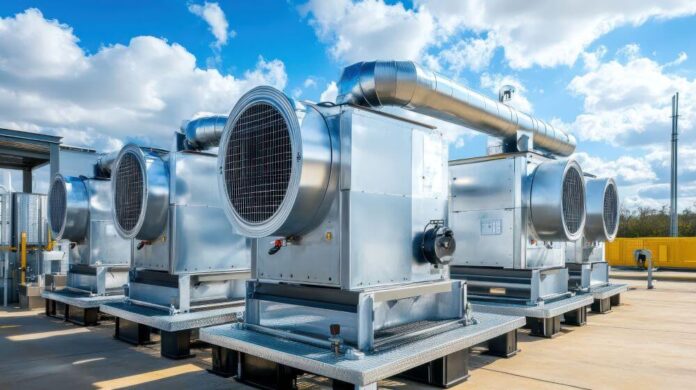If you’re running a storage facility, warehouse, or a business that relies on maintaining steady indoor conditions, you know how crucial temperature and humidity control can be. The right air system can make the difference between preserving your assets and dealing with irreversible damage.
This is where the debate begins. Should you rely on traditional HVAC systems, or invest in modern climate control units designed for precise environmental management? Continue reading to find out.
Understanding the Basics: Climate Control vs HVAC
It helps to understand what each system does before diving into which one fits your operations best. HVAC systems—short for heating, ventilation, and air conditioning—are commonly used to regulate air quality, temperature, and comfort inside buildings. They’re ideal for homes, offices, and commercial spaces where comfort is the primary goal.
A climate control unit, however, takes things a step further. These systems go beyond simple heating and cooling. They manage humidity and temperature regulation, alongside air filtration to protect sensitive materials from extreme temperature swings, mold growth, and air contaminants. This makes them a top choice for indoor storage facilities, laboratories, or data centers, anywhere precise conditions are vital.
The Common Challenge: Balancing Temperature and Humidity
Storage facilities or indoor storage units often struggle with inconsistent humidity levels or rapid temperature shifts. Traditional air conditioners can cool the air, but they don’t always balance relative humidity or eliminate moisture effectively. Over time, this imbalance can cause mold and mildew, water damage, or warping in stored materials like furniture, photographs, and electronic equipment.
This is where a custom environmental control unit (ECU) becomes a game-changer. Unlike generic air conditioning setups, these systems are tailored to your exact storage needs. Military facilities in extreme temperatures and climate-controlled storage spaces in humid regions like the southeastern United States or parts of North America can benefit from such units.
How a Custom Environmental Control Unit Solves These Issues
ECUs integrate air filtration systems, moisture absorbers, and specialized controls that keep your environment consistent, even when regional weather patterns vary.
Because the system addresses specific environmental challenges, it ensures better temperature regulation and humidity control. It can also handle a range of factors like sensible load (the energy needed for cooling air) and latent load (the energy used for removing moisture). In short, you get a system that minimizes temperature swings, prevents mold and mildew, and creates a cleaner, healthier atmosphere for your items or equipment.
Comparing Applications: Which Fits Your Operations Best?
If your goal is simple comfort or keeping people warm in winter and cool in summer, a standard HVAC system will likely do the job. It’s cost-effective and easy to maintain. But if you’re in a business where even small temperature shifts or humidity fluctuations can cause losses, a climate-controlled setup is the smarter choice.
For example:
- A storage facility that houses important documents or antique furniture benefits more from a climate-controlled unit than a regular HVAC.
- Indoor storage providers who deal with valuable belongings like artwork, electronics, or musical instruments can prevent damage through advanced humidity regulation.
- Drive-up storage locations in areas with hot summers and cold winters may need hybrid systems that integrate elements of both for flexibility.
Apart from safeguarding a climate-controlled facility, ECU can protect storage containers and multi-story storage buildings where airflow consistency is harder to maintain.
Beyond Comfort: Enhancing Performance and Productivity
For businesses, climate control is also about enhancing performance and productivity. Stable environments help machinery and sensitive materials perform at their best. In manufacturing, for example, a consistent environment ensures product quality and reduces maintenance issues.
Workers in indoor storage units benefit, too. Cleaner air and comfortable temperatures improve focus and reduce downtime, while automated systems minimize manual monitoring.
For businesses that rely on secure facilities, ECUs ensure reliability and protection without excessive energy use. Features like high-tech gate access systems, motion-sensor lighting, 24-hour surveillance, and elevator access and you create a safer, more convenient operation for both staff and clients.
The Broader Impact on the Self-Storage Industry
The rise of climate-controlled facilities is reshaping the self-storage industry market across the world. As customer demand for better protection grows, more companies are upgrading their systems to deliver a premium climate control experience. Tenants today aren’t just looking for space. They want secure facilities that keep their items in pristine condition.
A well-maintained climate-controlled storage setup can also support long-term storage lease agreements, helping operators retain clients and attract new ones. Through pest prevention and by minimizing risks like mold growth and water damage, facilities gain a reputation for reliability and quality customer service.
Final Thoughts: Choosing the Right System
The choice between climate control units and HVAC systems depends on your goals. If you’re running a self-storage operation, managing sensitive goods, or handling temperature-dependent materials, investing in a custom environmental control unit can give you precision and peace of mind.
Meanwhile, standard HVAC systems are great for everyday comfort, especially in offices and spaces with simpler airflow and temperature regulation requirements. Either way, the key is to understand your environment, assess your storage needs, and choose a system that keeps your assets and your operations safe, stable, and efficient.
